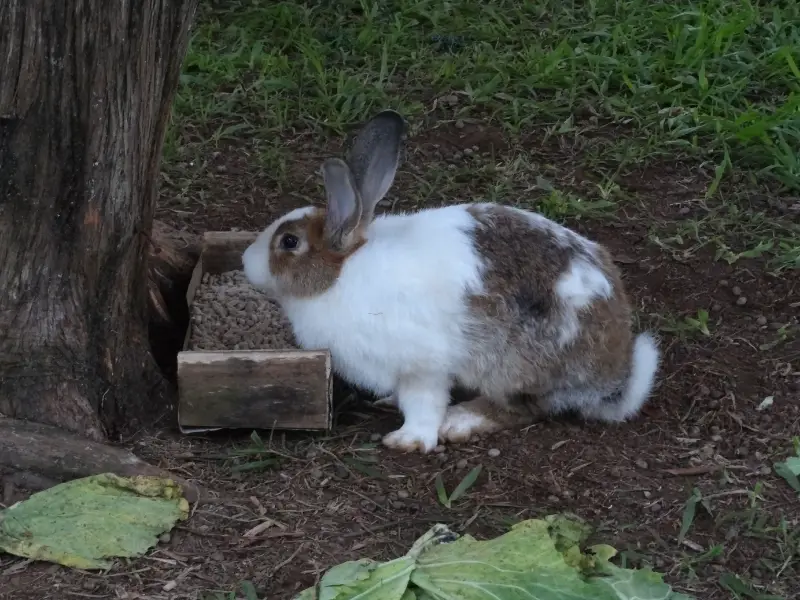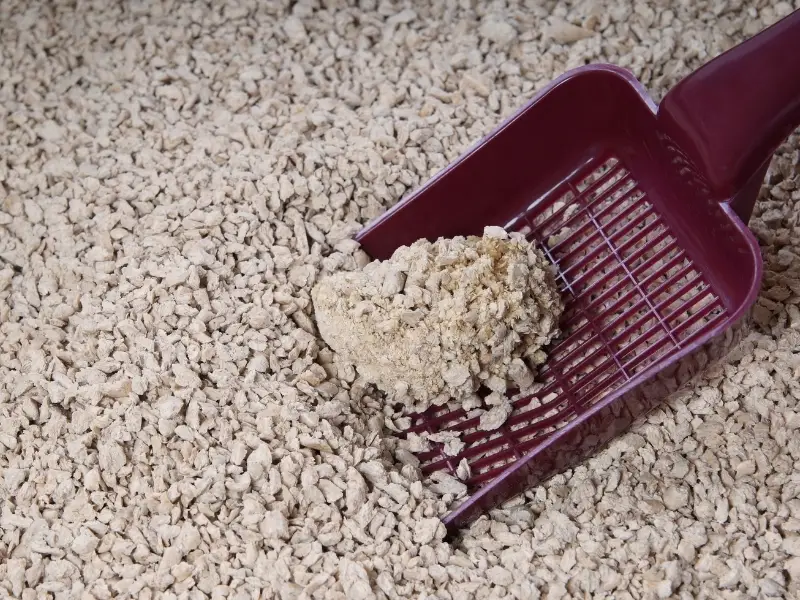Rabbits are very clean animals. Like cats, they groom themselves fastidiously. You may have seen your bunny smooth its fur, lick its paws, and clean its bottom. But is that all your bunny does? Or does it eat its own poop while cleaning down there?
Rabbits do eat their own poop. Since they mostly survive on high-fiber foods, which isn’t the most easily digested food type, a lot of the nutrients a bunny needs stay behind. So a rabbit produces two kinds of poop but only eats one kind, called cecotropes, to extract the nutrients they need.
This ensures a bunny gets all of the nutrients they need and it also helps their digestive system to work optimally.
Many pet owners find this quite disgusting, but rabbits aren’t the only animals who eat their own poop. Maybe learning more about this and how it is vital to your fluffy long-eared friend’s survival will help?
Coprophagia in Rabbits
Coprophagia, or coprophagy, is the eating of dung or feces. There are animals that shouldn’t eat their poop, like dogs, because there is no nutritional value in this action; however, with rabbits and some other animals, it is a different story.
In rabbits, coprophagia is normal, and it is natural as bunnies eating their own feces has health benefits and helps your fluff-ball to thrive.
Why Do Rabbits Eat Their Poop?
The kind of poop that rabbits eat is called cecotropes; however, even though it is expelled through the rectum, it isn’t technically poop.
It’s a food source that is nutrient-rich and valuable. And your pet bunny needs to eat these to survive. Cecotropes contain more vitamins, fiber, and protein than normal feces.
Since rabbits are foraging herbivores, their diet is mostly made up of grass and herbs (especially in the wild). These high-fiber foods are not easy to digest and a lot of the nutrients stay behind in their intestines.
Hindgut fermentation is the special process that takes place in the intestinal tract, called the cecum. During the fermentation process, enzymes and bacteria are added to the digestive tract and cecotropes are produced.
Thus, the pre-digested food is then excreted as cecotropes, which these mammals can ingest. Bunnies digest these cecotropes and extract the nutrients in a more concentrated form as it is now more digestible due to the hindgut fermentation process.
Eating the cecotropes helps keep their digestive system working smoothly.
Thus, if a rabbit eats a healthy diet of hay, leafy greens, veggies, pellets, limited treats, AND cecotropes, they are sure to get all of the nutrients they need to survive and stay healthy.
Rabbits eat cecotropes in the early morning or at night. Rabbits should not be consuming their normal poop during the daytime. Cecotropes are only produced at night, and thus, they are also called night feces.
What Kind of Poop Rabbits Eat?
Your bunny produces two kinds of poop. One type is little rounds or balls, and these are crumbly and dry, and they don’t smell.
Normal feces come in the size of peas or chickpeas, and they are light to medium brown in color. This is the kind of poop you will see in your rabbit’s cage, or in their litter box, and as they hop around during the day.
The second type of poop, the kind they eat, is the cecotropes. These are dark brown, sticky (since they are coated in mucus), soft, and pungent. It is also quite small, about half the size of a rabbit’s normal fecal droppings.
Most rabbit owners never actually see these as they are almost immediately consumed as soon as they exit the rabbit’s body. However, you may see these small raspberry-like clusters if your bunny isn’t feeling well, and thus, not eating the cecotropes.
Signs of Rabbit Eating Poop

You won’t see lots of cecotropes lying around your bunny’s cage or hutch. Generally, it will seem as if your fluffy friend is grooming its anal area while it is actually eating the cecotropes as they come out.
You may wonder how your bestie knows which kind of poop to eat. The normal dry kind doesn’t contain any nutrient value, so there is no use in consuming these droppings.
However, your rabbit knows that the cecotropes are on their way because a neurological signal is sent. Your bunny then instinctively starts eating this food source.
If you check your bunny’s hind end and see cecotropes stuck in your bunny’s fur, then it isn’t eating the special poop as it should. A rabbit normally has a clean bottom because it eats the cecotropes as they come out.
Next, if you only see normal dry poop in your bunny’s litter box or around its cage, then your furry pal is eating the cecotropes.
Lastly, your rabbit will seem to be cleaning its behind while it is actually eating the cecotropes early in the mornings or late at night.
Should You Stop Your Rabbit From Eating Poop?
Definitely not. Your rabbit needs the cecotropes to help it properly digest the nutrients in fibrous foods, like hay, which don’t digest easily. Hindgut fermentation and the cecotropes help rabbits to be healthy and get the nutrients they need.
Also, don’t disturb or bother your bunny when you see it cleaning and eating from its bottom.
A Rabbit’s Diet and Cecotropes
A bunny needs to eat a balanced diet to produce the right amount of cecotropes they need. If your bunny is producing too many cecotropes (you’ll see these in the little box or around the cage), then their diet may be unhealthy or unbalanced.
This means their diet is too high in sugar and too low in fiber.
Thus, ensure you feed your rabbit a balanced and healthy diet of:
- Hay (80% of their daily diet)
- Leafy greens (1-2 cups per day)
- Pellets (¼ to ½ a cup per day)
- Treats (1-2 tablespoons per day)
Final Thoughts
Eating cecotropes, a kind of poop that is actually a vital and nutritious food source, is important for your pet rabbit.
Since bunnies struggle to digest the fiber from the plant-based diet they consume, their digestive tract makes cecotropes, which contain the digestible fiber and nutrients they need to survive.
Feeding your bunny a healthy and balanced diet ensures your rabbit is able to produce the number of cecotropes it needs to stay healthy and thrive.
Related Articles:

